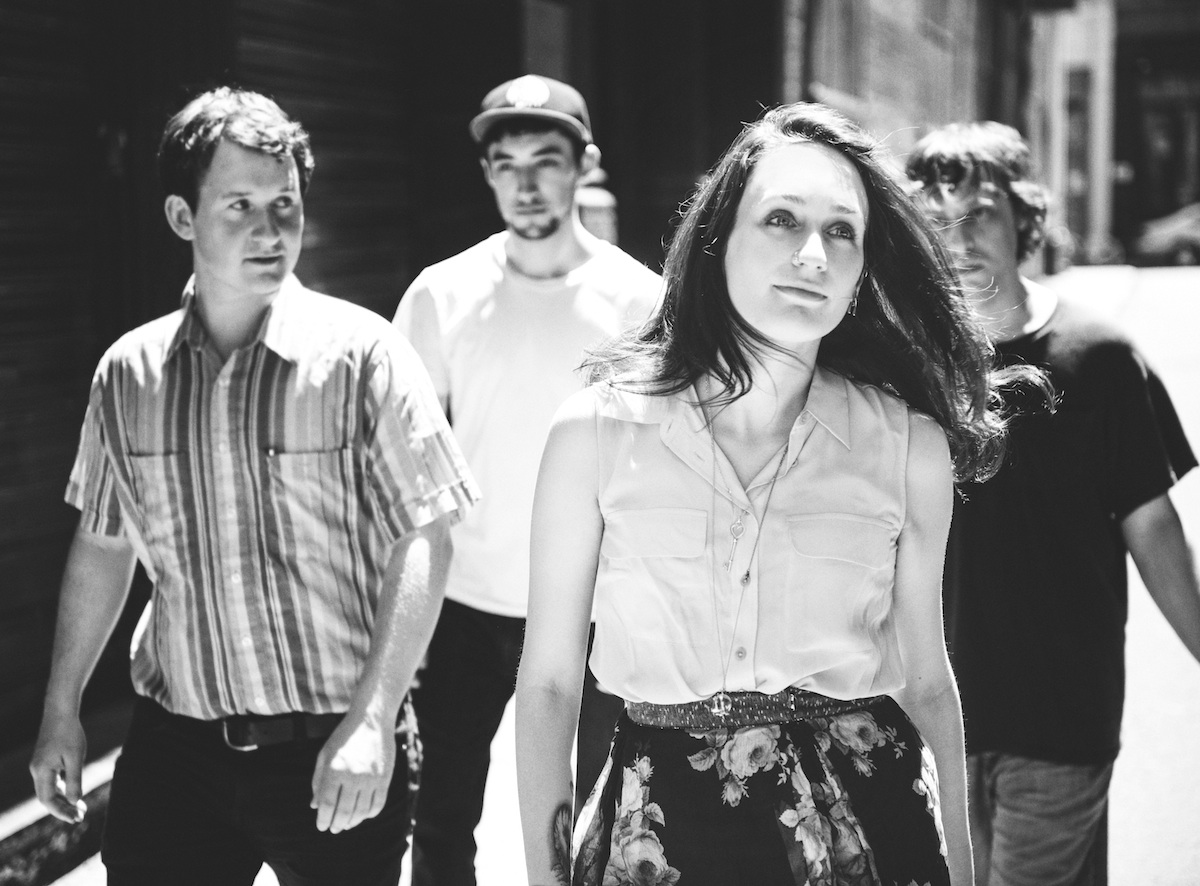The Major-League Speedy Ortiz

ABOVE: SPEEDY ORTIZ. PHOTO BY CHRISTOPHER GABELLO
Speedy Ortiz is defying the times. In its approach to both recording and touring, the band has built its fan base in an alternatively modern way: music lovers first, commercialists second. Admirable, sure—but Sadie Dupuis (guitars & vocals), Matt Robidoux (guitars), Darl Ferm (bass), and Mike Falcone (drums) are more than just that. With their immaculately constructed debut album Major Arcana, due out on July 9, Speedy Ortiz is showing they’re greater than the sum of their easy ’90s rock comparisons.
Interview recently caught up with Dupuis and Robidoux over Google Hangout, across multiple time zones and continents. The two patiently dealt with technological problems and questions about overnight success, DIY guitar freakouts, and the making of Major Arcana.

JARED LEVY: Sadie, the last time I saw you, you were playing with the band Quilty in New York City. Could you catch me up on how you stared playing as Speedy Ortiz?
SADIE DUPUIS: Well, I moved up to Northampton to work on a MFA, which I think I told you. Forever ago. [laughs] I guess that was in 2011. And I met Matt pretty shortly after moving up. Matt was one of the first friends I made when I moved up to Northampton, so we started playing together on some songs that I’d been working on by myself, and ultimately that just turned into a project that we wound up focusing on more than other projects that we were working on. That’s how it started and we’ve kept really busy since then, which was fruitful.
LEVY: You’re gaining a lot of support from notable publications, such as Rolling Stone, Pitchfork, and Spin. How surreal is that? Was this a slow build or does it feel like it happened overnight?
DUPUIS: To some degree, we were lucky early on in that local press was really supportive of us. Probably just because we spent a lot of time reaching out to writers we liked as well as bands that we liked who happened to have members who were writers. But as far as the bigger publications, to me at least, it seems pretty overnight. If you asked me two months ago that any of that shit would have happened… [laughs]
LEVY: Are you seeing an effect with attendance at your shows?
MATT ROBIDOUX: I have in New York. We’ve been to Cake Shop. I was really impressed how many people showed up there.
DUPUIS: A show that I didn’t expect to sell out recently sold out. It was crazy. So, I guess to some degree.
ROBIDOUX: But I feel like we’ve been lucky enough to play good shows from the beginning, because we’ve had the experience in other groups. We’ve been lucky enough to play very few lame shows.
DUPUIS: We do everything possible to play with bands that we think are cool. So even when we were booking the first tour, Mike had some random band he knew from a message board that he loved from Kalamazoo, so we made that a focus of the tour, to play with the band that Mike liked from a message board in Kalamazoo. I think that’s part of why it’s been fun. We’ve really made sure to play with bands that we like and meet bands that we think are doing cool stuff.
LEVY: You seem to have navigated touring in a way where you’ve been able to do something locally in Boston, but also get national exposure. How do the two compare?
DUPUIS: In a way, it feels good to have put in the work in terms of touring and meeting a lot of bands nationally, because it makes it feel slightly better when a blog from, like, Atlanta writes about us rather than just having put something up online. I think if there’s any sort of national attention, I hesitate even to say that, because I don’t know if I believe it, but it’s because we’ve toured the country a couple times now. We do make it a point to connect with other music scenes that we think are like-minded or are interesting.
ROBIDOUX: I think we’re in a middle period, or something. Where we’re playing some club shows that are booked by a booking agent, and we’re playing DIY shows that are interspersed. And we retain, for those club shows, an identity of the city we’re playing in, instead of just playing in a club, packing up, and having it be no different than any other place. We want to avoid doing that, which can be a danger for some bands that break out in the national scene.
LEVY: Matt, while I haven’t met you in person, I read about some of your memorable guitar solo at these DIY shows. Maybe the freedom to explore a space fits your ethic?
ROBIDOUX: I guess it’s more of the audience barrier not being as present in DIY shows. It’s the intimacy of shows like that. Not having a physical barrier. Like our last show at Big Snow, the audience just sort of took over the stage and I passed my guitar around to people and they hit it during the climax of one of our songs. That’s a lot less likely to happen at a big club show. It allows for more spontaneity.
LEVY: Switching gears, I’d like to talk about the album. What is it about these songs that stick and make this an album for you?
DUPUIS: I’m someone who always listens to full albums and was writing with the intention of a particular sounding album. I think even from some of the demos that were extremely early, only one or two of the songs are from before when this was a full band. Even when I wrote those I kind of had an idea of what kind of album they’d go on. As the other songs came into being, they were specifically like, “This will be this part of the album that needs this kind of tone.”
ROBIDOUX: Looking at the album as a complete piece, like Sadie was saying, with a dynamic arch. In deciding what material to use, even though we had other songs that could go on the album.
LEVY: I’ve noticed that there’s this weird effect with the album. It’s a short in length, but it feels long when I listen to it. I don’t know what it means, and I don’t know how this can be a question, but I wondered if you had any insight into this phenomenon.
DUPUIS: We jam lot of musical ideas into one piece, so not only are they kind of short, but I think we try to cover a lot of ground in any two-and-a-half-minute song. So maybe while the length is not especially long, there are a lot of musical ideas that would fit in a longer album if we repeated the particular phrase more within in a song. That’s something I’m always conscious of. I don’t like repeating things too often within a song or at all. I like songs that start in one place and end in a completely different place, and you can’t really do that without incorporating a lot of ideas.
SPEEDY ORTIZ’S MAJOR ARCANA IS OUT NOW. FOR MORE ON THE BAND, VISIT ITS FACEBOOK PAGE.






